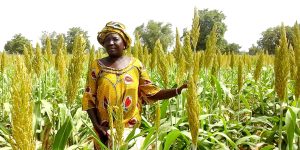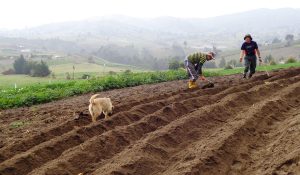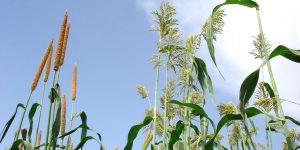The McKnight Foundation is using farmer research networks to fundamentally alter the balance of power in agricultural research and practice
At 13,000 feet above sea level, Bolivia’s windswept Altiplano region is a notoriously difficult place to grow crops. That vulnerability also makes it an appealing place for well-intentioned scientists and NGOs to work, testing solutions to help end hunger and save lives in the Andes.
This familiar scenario can miss a key point: the people who have farmed this land for centuries have an intimate understanding of the weather patterns in this corner of the world. They can tell by observing the ways animals are behaving or clouds are spreading across valleys if the growing season is going to be wetter than usual. And they can make informed decisions for their communities and their livelihood, integrating new understandings and practices with their experience.
There’s a question of principle as well as practice at stake here. ‘While the term “decolonising philanthropy” is newer to the field, McKnight has been working for years to embed its equity and inclusion principles into our approach across our programmes and the broader foundation,’ says Kara Inae Carlisle, vice president of programmes at the McKnight Foundation. ‘A prime example is through our global agroecology work that brings together farmers, researchers and scientists in Africa and South America to engage in communities of practice with peers from across the world.’ Foundation president, Tonya Allen, agrees: ‘I think about using McKnight’s resources in a way that is reparative. We strive to create healing in communities where wealth was extracted.’ The foundation’s International Programme supports farmer research networks (FRNs) to promote a more equitable system that gives smallholder farmers and farm communities a voice in our collective future. Since 2013, the foundation has supported 30 farmer research networks ranging in size from 15 to more than 2,000 farmers.
They can make informed decisions for their communities and their livelihood, integrating new understandings and practices with their experience.
Farmer research networks show us that agriculture, food systems, equity and our planet are intricately connected. When local farmers have a say in the health of their food, water and resources, and share their knowledge, they are a force for global change. They can create healthy, sustainable food systems that feed families, mitigate climate change and improve the livelihoods and resilience of entire communities.
Farmer research networks in action
In addition to promoting greater equity, farmer research networks help increase sustainable agroecology practices. These networks bring together farmers, research institutions, development organisations and others to improve agriculture and food systems for all. In a co-created process of sharing and building knowledge, these networks seek ecological solutions tailored to specific regions, considering local farmers’ needs, priorities and wisdom – including those of women and other historically marginalised groups.
For example, in the Altiplano, smallholder farmers collaborate with a researcher in La Paz to identify weather and climate trends using traditional forecasting methods – in this case observing cloud cover – and also analysing data from 16 weather stations across the Altiplano. Farmers share these findings with each other on a WhatsApp group, democratising access to data and analysis.
In Malawi, FRN member Monica Nkweu describes another example of local collaboration. ‘Researchers introduced doubled-up legume interplanting. We also brought in our own Indigenous knowledge – we plant maize with pigeon peas to attract ants. The ants feed on the fall armyworms that attack our maize. This is our own biological control.’ These relationships among farmers, researchers and NGOs place equal value on science and Indigenous and traditional knowledge. They are also a powerful antidote to the history of the Global North in the Global South, extracting valuable resources and then giving on its own terms. In 2021 we collaborated closely with the Global Alliance for the Future of Food in the release of The Politics of Knowledge: Understanding the evidence for agroecology, regenerative approaches, and Indigenous foodways. One of their key findings was that to create equitable, sustainable food systems we need to decolonise and democratise knowledge systems within education, research and innovation.
Enhancing farmers’ ability to access and adapt agroecological innovations and build community also builds power, and can improve their productivity, food security and resilience. Farmers participate fully in the research process and share ideas and innovations widely throughout their networks.
In the arid Maradi region of Niger, the Women’s Fields project is testing the efficacy of readily available fertilisers, including human urine, and teaching women in other regions how to do the same. In Ecuador and East Africa, farmers are working to manage crop pests without relying on chemical pesticides. Farmers are collaborating with researchers in western Kenya to improve the formula for bokashi, a compost made from food waste, and in Burkina Faso to enhance the productivity of bambara, a groundnut that is an important source of protein. Female farmers in villages in West Africa have successfully tested and selected pearl millet seeds to cross-breed so that they can be grown in areas of low fertility.
The key principles
We found that several key principles were integral to the success of the farmer research networks. First, farmers should come from a diversity of experience and participate in the whole research process. Second, the research should be rigorous, democratised and useful, focused on practical benefits to farmers and their particular contexts. And third, the networks have to be truly collaborative and facilitate learning and knowledge sharing.
To create equitable, sustainable food systems we need to decolonise and democratise knowledge systems within education, research and innovation.
One of the greatest challenges to farmer engagement has been the legacy of conventional top-down research and extension practices. Ingrained historical social, cultural and educational norms have perpetuated dynamics that have marginalised farmer agency and knowledge, while favouring that of researchers, professors, scientists and those with formal education and high levels of literacy in a dominant (colonial) language. Farmers had been taking advice from various types of external advisers for years and often lacked the social legitimacy, personal confidence and skills to engage as equals. To shift these dynamics, researchers and farmers alike had to be willing and able to engage in new types of relations. Many FRNs intentionally chose researchers who were committed to participatory processes to try to build more horizontal relationships among equals. ‘This kind of co-creative, power-sharing work is what decolonisation looks like in action,’ says Kara Inae Carlisle. ‘It’s not easy, and it takes a commitment to nurturing authentic relationships over time.’
The FRN experience has taught us that it is possible for funders to initiate, support and participate in a successful community of practice comprising its grantees. Long-term investments in convenings and facilitation is important for building trust and establishing working relationships. Funders must also be prepared to relinquish some control over outcomes, because by design these communities of practice create collaborative and horizontal relationships, where local practitioners have a seat at the table and can take turns leading. Of utmost importance is a commitment to listening, learning and adaptation and a dedication to shifting colonial structures and mindsets.
‘Addressing historical political and social systems that are compounded by racism, colonialism and patriarchy is daunting and overwhelming – especially if you work at a foundation and you just want to do some good,’ says Tonya Allen. ‘But we have to put in the work. Inequity must be addressed with radical love, and we must combine radical love with knowledge, authentic relationships, change leadership, power and persistence.’
Jane Maland Cady is International Programme director at McKnight Foundation.
Email: jmalandcady@mcknight.org
Twitter: @McKnightFdn
This article is being offered free to read thanks to sponsorship from the McKnight Foundation.









Comments (0)